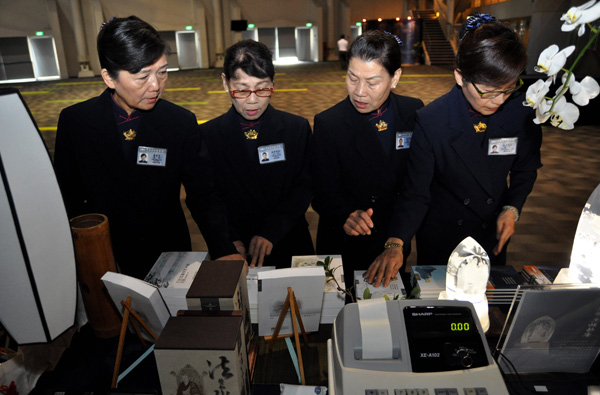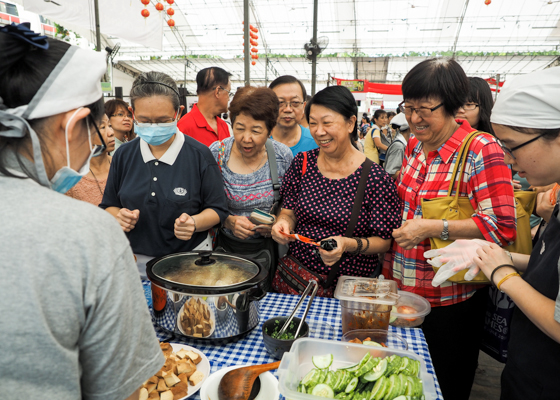
Tzu Chi is providing food delivery for care recipients, with each insulated food containers filled with rice and two dishes. Not only are they nutritious, but also pleasing to the eyes.
She is a caretaker to her disabled husband. During the circuit breaker period, she was worried that leaving her house would increase her probability of contracting COVID-19, and consequently putting her husband at risk. She tried to stay home as much as possible, therefore both of them relied on non-perishable and canned foods for their three meals. Until one day through, the living conditions of this Malay couple was found out by Tzu Chi volunteers through a phone call. The care recipients’ food supplies were quite low, so the volunteers immediately helped them to apply for financial aid and bought food for them, including bread, which was specifically requested by the care recipients.
“She was overjoyed when she saw the bread brought by the volunteers,” said Khoo Jyh Hao, Head of Tzu Chi Singapore Charity Development Department. He lamented, “A simple loaf of bread could bring so much satisfaction to our care recipients, not to mention how much a warm meal could bring to them.”
Khoo expressed that Tzu Chi must take initiative to understand how the care recipients are faring during the circuit breaker, following the discovery of the distress faced by the Malay couple mentioned above. Through phone calls, volunteers found that some care recipients have trouble leaving their homes, some are living alone, some have limited mobility, and some are elderly couples, hence they have no way to take care of their three meals properly. Some care recipients with chronic disease faced problems with preparing their meals too. He then shared about a case of a care recipient with chronic asthma problem. Not only would he have asthma attacks from time to time, there was no one at home to cook for him.
“During circuit breaker, every person needs to wear a mask. Imagine a person with breathing difficulties having to handle a motorized wheelchair and queue for takeaways. The need to don a face mask adds on another layer of complication to the patient. Because of these vulnerable group of people, we decided to initiate a programme to deliver food,” said Khoo.
Food: Delivering Warm Rice with Two Dishes
From 7th to 31st of May 2020, Tzu Chi Singapore kick-started the Epidemic Relief Programme for Tzu Chi Care Recipients Phase 3.0 - "To-gather Vegetarian, Loving Kindness Meals Delivery Programme”. This 25-day programme aimed to deliver lunch and dinner on weekdays, and lunch only for weekends, to care recipients who have trouble preparing meals or leaving their homes for take-outs.
There were many considerations during the meal preparations due to individual differences in food preferences, health conditions, religious restrictions and many more. Khoo said, “Some care recipients do not take eggs, some want smaller portions, some do not want spicy food, there were even some who have trouble swallowing, so they need semi-solid food like porridge or soup-based food. Our principle is to consider everyone’s needs, then we try to customize the food to meet everyone’s demand.”
Tzu Chi volunteer Gooi Seak Wah, who operates a vegetarian hawker stall, was responsible for providing the meals. Although his business was affected by the circuit breaker, he still provided meals to care recipients without gaining profit. He added, “Two dollars for a meal is a price to remind me to be grateful.”
Gooi is grateful to Master Cheng Yen for establishing Tzu Chi Foundation that has given him the opportunity to contribute. He added, “Many of these care recipients are taking vegetarian meals for the first time, I hope that the care recipients can be motivated to become vegetarians because of this meal delivery programme.”
 Gooi Seak Wah is grateful for the initiation of this meal delivery programme by Tzu Chi to solve the meal problems faced by care recipients.
Gooi Seak Wah is grateful for the initiation of this meal delivery programme by Tzu Chi to solve the meal problems faced by care recipients.

Tzu Chi provided two sets of insulated food containers for each care recipient. Not only are they environmentally friendly, they can keep the food warm.
Until today, COVID-19 has been ravaging many countries for a few months. It has affected each and every one of us, but to care recipients, the impact is worse than most have to endure.
“As a kidney dialysis patient, my immune system is weak, sometimes I feel uncomfortable and lethargic. When Sister (Tzu Chi Volunteer) heard about my situation, she asked if I would need help. I really do need help when I don’t feel well, so I am very grateful for her,” said Huang Zhen Xiong, a dialysis patient who moves around on a motorized wheelchair.
Through regular calling of the care recipients, volunteers found out about Huang’s health condition and that he had always gone out for takeaways or cooked instant noodles for his meals before the meal delivery programme. He said, “The circuit breaker has indeed brought much inconvenience to me. I have mobility issues, so it is troublesome for me to queue up with so many people around.”
Huang, who is at higher risk for COVID-19, was very thankful for having meals delivered to his doorstep during such difficult period. He added, “Your service is very good, that has brought immense help to me. I sincerely thank all of you.”
Another care recipient, Lin Rui Zhen shared that due to her inability to stand for prolonged periods of time, she has been having biscuits, Milo drinks and boiled potatoes for her meals. She remarked, “I really appreciate having these warm meals delivered, if not I would have to sustain myself with coffee, milo and potatoes for the rest of circuit breaker. The thought of it made me shudder.”
Lin gave feedback that the food portion was just nice, and that the vegetarian food was gentle to her digestive system.
Transportation: Establishment of the Caring Car Fleet
“During circuit breaker, we could not let volunteers deliver meals to the care recipients. Therefore, we set up the Caring Car Fleet,” Khoo explained that the Caring Car Fleet was made up of volunteers or care recipients who are taxi or private hire car drivers. They became responsible for delivering the meals. This framework is similar to Tzu Chi’s cash-for-work relief programmes, usually carried out in disaster-stricken areas in the world.
In order to put a halt to the pandemic, the Singapore government announced that from 7th of April 2020, except for wet markets, supermarkets, hawker centres, public transport and other essential services, all non-essential services were not allowed to operate. Khoo realized that under such circumstances, the crowds would be much lesser, causing taxi drivers to lose a large portion of their customer base. He felt that the Caring Car Fleet was a win-win solution. Not only could the taxi and private hire car drivers earn some income, it would solve Tzu Chi’s logistics problem of not being able to transport donated computers, raw materials for making face masks and warm meals.
“Relief effort is not about distributing a lot of cash, it is about settling down the minds of the victims. When they regain their confidence, we provide them an opportunity to contribute.” This is the explanation given by Master Cheng Yen on the rationale behind Tzu Chi’s cash-for-work relief programme.
For this mission, Tzu Chi managed to recruit 12 Tzu Chi volunteers and care recipients to join the ranks of the Caring Car Fleet. During the pandemic, Tzu Chi launched programmes like the “Let’s Pay It Forward” programme that distributed Chromebooks and laptops to children of care recipients or the reusable mask projects that was carried out in a few phases. These programmes required a lot of logistics arrangements, and this was where the Caring Car Fleet played the role of “courier delivery company”.

Volunteers or care recipients who are taxi or private hire car drivers became responsible for delivering meals.
Following the outbreak of COVID-19 from Wuhan, China earlier this year, Tzu Chi Foundation (Singapore) rolled out an Epidemic Relief Programme for Tzu Chi Care Recipients on the 8th of February. The programme is carried out in three phases, namely contacting care recipients through phone calls, dissemination of positive and accurate information, as well as distribution of relief materials, to aid and show care to Tzu Chi Singapore’s long-term care recipients during this period of pandemic.
Due to the constantly evolving nature of the pandemic, government measures as well as the needs of the care recipients, the Epidemic Relief Programme was being carried out in stages. In the first stage, the focus was on physical and mental health. Currently, the programme is in its third stage, with emphasis on safety and education. Care would be provided in areas of “food, clothes, accommodation, transportation, education and entertainment”.
Everyone is affected when a virus outbreak happens, and the impact is much greater on the vulnerable groups. Tzu Chi recruited drivers to set up Caring Car Fleet and invited vegetarian stall owners to prepare meals. These aimed to provide “food” and “transportation” to people who need them, forming a sense of stability amidst the chaos that is ongoing now.



